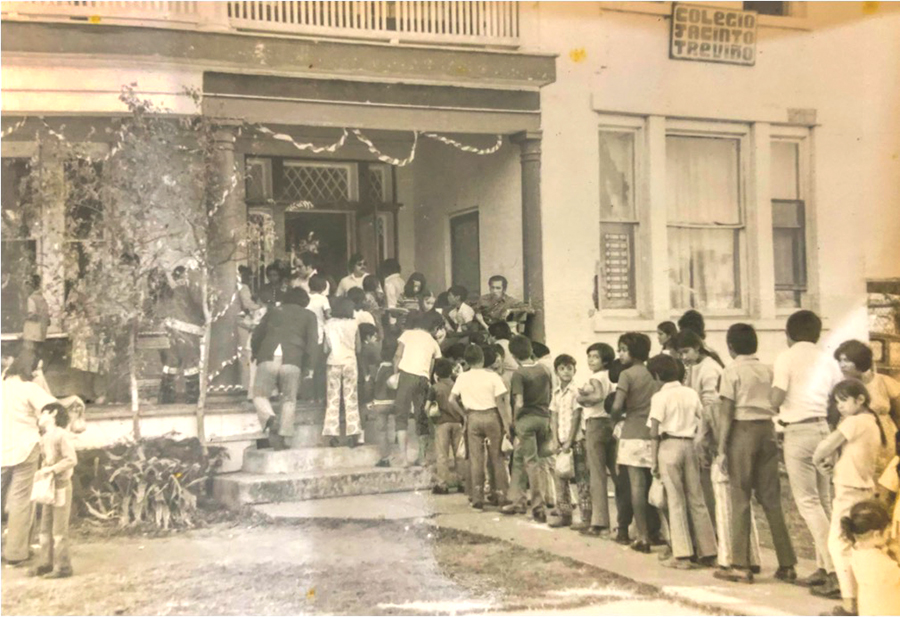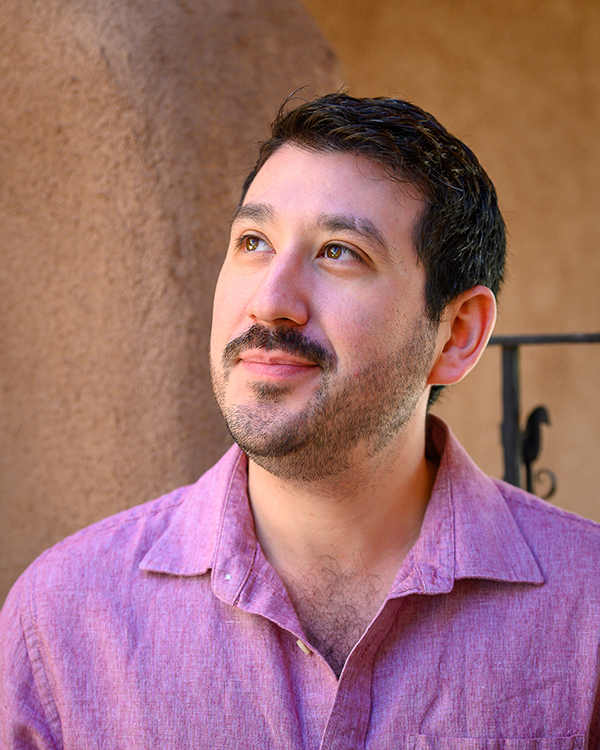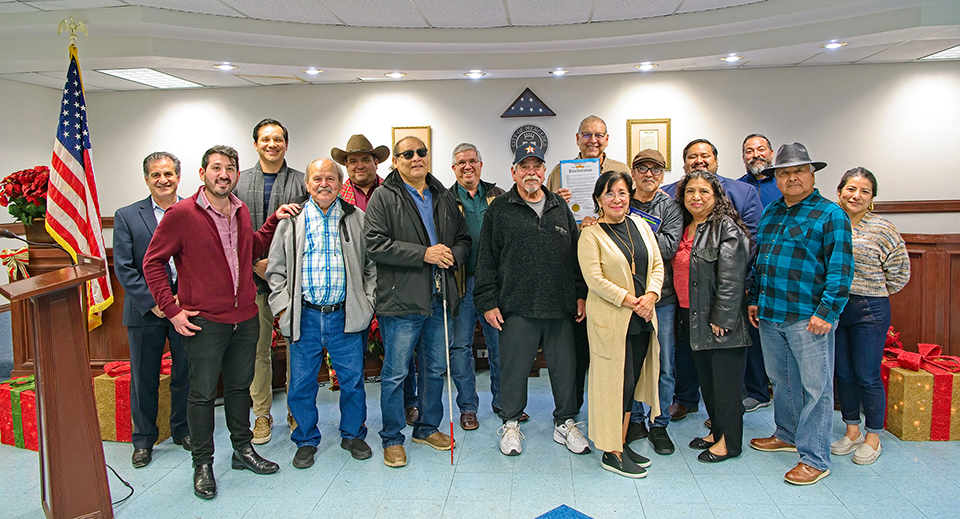Colegio Jacinto Treviño Day Proclamation with former students of the Colegio, city officials, and historian Derek Xavier Garcia. Photo by René Rentería.
Derek Xavier Garcia’s work is living and active. Not only does he interview members of the community for his dissertation and future book, he engages with them, bringing history to life in the Rio Grande Valley of Texas.
Garcia was in Paris pursuing his Master’s Degree in Civilisation Américaine at the Université Sorbonne Nouvelle when he found out about Colegio Jacinto Treviño, the first Mexican-American institute of higher learning.
“Really? I’m in France? How come I didn’t learn about this?” said Garcia, stunned at the irony that he was over 5,000 miles away from his home, which was seven minutes from the site of Colegio Jacinto Treviño.
“Unfortunately, Mexican-Americans like myself tend to discover a lot about their history outside of home,” said Derek Xavier Garcia, Ph.D. candidate at Concordia University Montreal and 2023-2024 Mellon Fellow at the School for Advanced Research in Santa Fe, New Mexico.
Garcia pushes back against the simplifying notion that these stories are lost. It’s more that the histories that communities preserve must be amplified by listening to those who retell them.
As a young man growing up in the town of Donna in the state’s southern-most region, Texas History Week did not include those community stories. While getting his Bachelor’s Degree in Religion and Spanish at Amherst College in Massachusetts, it was in Ilan Stavans’ Latin Literature course that Garcia became inspired by the folklore studies of Américo Paredes. The way Paredes mixed the sociological and cultural history of the Rio Grande Valley with folksong taught Garcia that history could be conveyed through engaging and unexpected means.
While at the Sorbonne Nouvelle in Paris, Garcia focused on the folksongs of the 1915-1916 Plan of San Diego conflict during his first year’s Master’s Thesis under the guidance of Jim Cohen, who enabled Garcia to hone the oral history method he implemented when returning home to conduct interviews during his second year’s Master’s Thesis.
Garcia published a call for those interested in sharing their memories of Colegio Jacinto Treviño in The Mercedes Enterprise, one of the oldest newspapers in the Rio Grande Valley. In it he wrote, “I am interested in speaking with people who remember and were involved with the school in any way” and continued “The way we remember is just as important as the reasons why we do.”
“Memory is not static,” Garcia said. It is dependent on who is present with the person remembering and that person’s age and feelings. Likewise, “social memory is also contingent on the political, the social, and the economic context of the time it’s being told.”

Colegio Jacinto Treviño came into being from a confluence of frustration, enthusiasm, and momentum from the high school walkouts of the late 1960s. The idea to start a school was pitched in 1969 at the same statewide conference of activists that founded what later became La Raza Unida political party.
The first Mexican-American institute of higher learning was formed by young people who ranged in age from 19 to mid-30s. Some did have advanced degrees, and most came from migrant worker backgrounds. They sought funding, grants, and accreditation, establishing and maintaining them for the school. These young academic leaders met with the deans of Antioch College; its innovative University Without Walls Program helped the school establish national academic credibility.
At Colegio Jacinto Treviño, the faculty, students, and the community itself were equally engaged in the administration of the school.
Reaching beyond the local community from the beginning, Colegio Jacinto Treviño provided opportunities for young Mexican-Americans to get advanced degrees. Importantly, women were leaders, taught courses, and engaged with student learning in creative ways. There were exchange programs with Mexico and California. There was a satellite school in San Antonio, Texas. Students performed and toured plays. “Through the theater troupe, women were able to express spaces and ideas that ran counter to patriarchal society,” Garcia said.
“I’m not trying to write a history of the school. I’m trying to have the school be a lens for deeper questions, a vehicle for the personal experiences and narratives of these individuals: students and founders and community members,” Garcia said.
Garcia is currently writing his dissertation about the impact of this history, expressing appreciation to the School for Advanced Research (SAR) for assisting him with his work during his nine-month residency.
“There are very few places like SAR that engender collaboration and openness,” Garcia said. “It helps to receive feedback from people coming from other disciplines such as ethnomusicology and anthropology.”
Giving back to the community is important to Garcia, among academic peers and also at home.
The promising and influential school officially closed in 1976 due to splits in ideology. Some wanted the school to be more engaged in the Chicano social movement protests of the time while others wanted to continue to focus on progress through education rather than direct action.

Derek Garcia at SAR. Photo by Garret P. Vreeland.
Although open for a short time (1970-1976), its impact rippled well into the future. Students from Colegio Jacinto Treviño went on to leadership roles in education, law, and civil rights.
On December 20, 2022, Garcia celebrated Colegio Jacinto Treviño Day in Mercedes, Texas. An application for an Undertold Marker with the Texas Historical Commission was recently approved and will provide a visual learning tool for young people and community members. The Viva el Colegio community group, of which Garcia is a part, is also planning a Colegio photo and materials exhibition at the Dr. Hector P. Garcia Memorial Library in Mercedes as part of a future commemorative event to coincide with the marker unveiling. In these ways, the past comes off the page. It is present. It is not lost.
